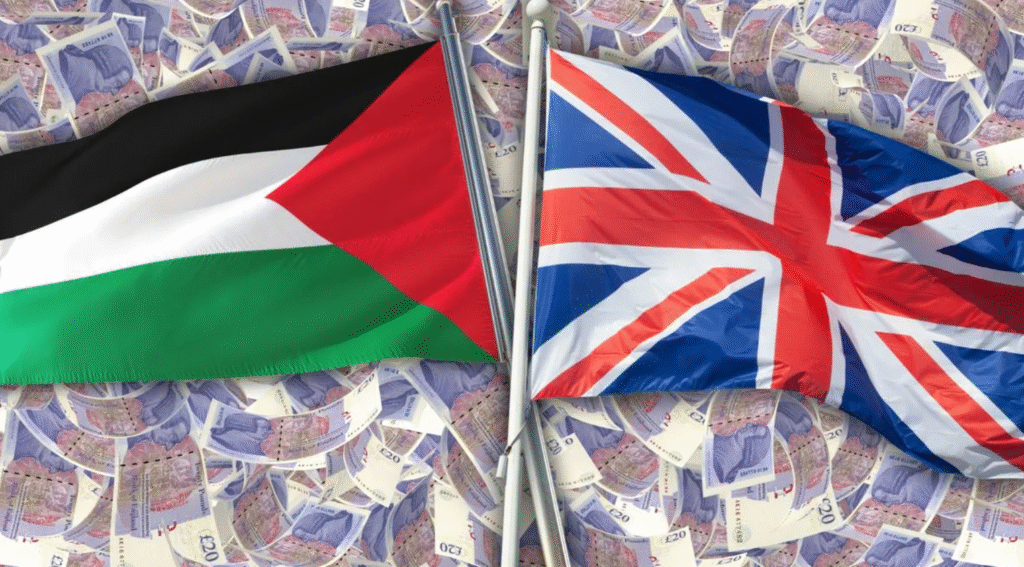Britain Palestinian Reparations: The recognition of Palestine by UK Prime Minister Keir Starmer has triggered an unexpected storm. Almost immediately, the Palestinian Authority (PA) announced a Britain Palestinian reparations demand valued at an astronomical £2 trillion. The figure, nearly the size of the entire British economy, is rooted in historical grievances dating back to Britain’s administration of Palestine from 1917 to 1948.
This bold demand has sparked political, legal, and international debates, forcing Britain to confront questions about its past role in the Middle East and the potential cost of symbolic recognition.

Britain Palestinian Reparations: The Historical Context
From 1917 until 1948, the UK governed Palestine under a League of Nations mandate. The Balfour Declaration of 1917, issued during this period, promised a Jewish homeland in the territory, a move that deepened tensions between Jewish and Arab populations.
Palestinian Authority President Mahmoud Abbas now points to international law, arguing that Britain’s actions directly contributed to decades of conflict, displacement, and loss. His £2 trillion Britain Palestinian reparations claim is positioned as compensation for land and injustices stemming from British rule.
Political Firestorm in the UK
The demand has deeply divided British politics:
-
Robert Jenrick, Shadow Home Secretary, called it “ahistorical nonsense” and assured taxpayers no money would be spent.
-
Nigel Farage, leader of Reform UK, slammed Starmer’s recognition of Palestine as “a mistake,” linking it to this enormous reparations demand.
-
Some Labour MPs expressed sympathy for the reparations idea, citing colonial history.
The government, however, maintains that recognition is purely symbolic and carries no legal or financial commitments.
Britain Palestinian Reparations: Legal Barriers Ahead
While the figure is shocking, experts say the likelihood of the reparations succeeding is extremely slim. International law provides multiple hurdles:
-
Sovereign immunity protects states from retroactive claims.
-
The passage of more than 75 years weakens legal grounds.
-
Establishing direct causation between Britain’s mandate and present conditions is nearly impossible.
Despite this, analysts warn that the Britain Palestinian reparations demand carries political weight, transforming a symbolic gesture into a potential tool of leverage for Palestinians.
Broader International Implications
The UK is not the only nation facing potential fallout. Canada has already entered the spotlight after Prime Minister Mark Carney recognized Palestine unilaterally, without parliamentary debate or electoral mandate.
Critics argue that Carney “chased symbolism over substance,” warning that Canada might also face similar reparations demands in the future. Recognition of Palestine, they say, risks straining ties with Israel, a vital ally in defense and technology.
Why the Reparations Debate Matters Globally
The Britain Palestinian reparations demand is part of a larger global conversation on reparations for historical wrongs, including slavery and colonialism. Even when financial compensation is unlikely, the expectation itself can fuel long-term disputes and reshape political narratives.
The Palestinian Authority has made it clear: recognition is not the end but the beginning. They plan to use symbolic victories to press for financial and political gains. Meanwhile, Hamas frames each recognition as proof that resistance yields results.
Reactions Beyond Britain and Canada
The developments come amid a wave of recognitions across Europe. During a high-level summit in New York, six nations, France, Belgium, Andorra, Luxembourg, Malta, and Monaco, joined Saudi Arabia in affirming their recognition of Palestine.
France, co-hosting the meeting, argued that recognition strengthens the case for peace. But critics warn that the timing, while hostages remain captive and violence continues, could encourage extremism rather than stability.
Britain Palestinian Reparations: Symbolism vs. Reality
Legal experts stress that no money is changing hands and likely never will. Yet the demand’s symbolic power is undeniable. It underscores how recognition, often dismissed as a gesture, can spark lasting disputes.
For Britain, the Britain Palestinian reparations case has become a test of how history collides with modern politics. While the Treasury faces no immediate threat, the conversation itself is shaping public opinion, party divisions, and international relations.

Conclusion: A Costly Symbolic Gesture
The £2 trillion Britain Palestinian reparations demand is less about financial feasibility and more about political symbolism. It reminds the world that historic injustices continue to shape today’s conflicts, and that symbolic recognition can have unintended consequences.
As more nations join the wave of recognition, the question remains: will others face similar demands, or will Britain stand as the unique example of how history’s shadow lingers over modern diplomacy?

